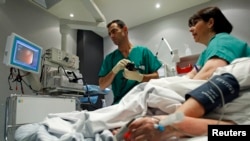The microorganisms that live in our intestines help keep us healthy, but U.S. researchers have identified two virulent strains of bacteria that are linked to the progression of colon cancer.
Cancer researcher Michael Burns said pinpointing which bacteria cause cancer in the large intestine could help identify patients who are at high risk for the disease.
“It could be that you see changes in the microbiome before the tumor even develops," he said, "and if you could do that, that would be fantastic for early detection.”
Burns and his team at the University of Minnesota found that genes of the microbes, called Fusobacterium and Providencia, were more abundant in 44 human colon cancer samples when compared with normal intestinal tissue.
Fusobacterium has previously been implicated as a cancer-causing microbe. This study, published in the journal Genome Medicine, is the first to link Providencia to the disease.
Burns noted that previous studies had identified major changes in gut microbiome of cancer patients, but it is not clear how the microbes cause colon cancer.
“It could be that the bacteria are changing for some reason or another, whether it’s diet or some other function of your immune system, and the bacteria are driving or causing a cancer,” he said.
A high-fat diet, particularly one that includes red meat, has been linked to a higher risk of colorectal cancer.
Antibiotic drugs are now used to kill H. pylori, a pathogen found in the stomach that is thought to cause stomach cancer, one of the most common cancers around the world.
It is possible antibiotics could be used to prevent or treat other cancers, especially if different bacteria use the same biological mechanism to cause disease.




